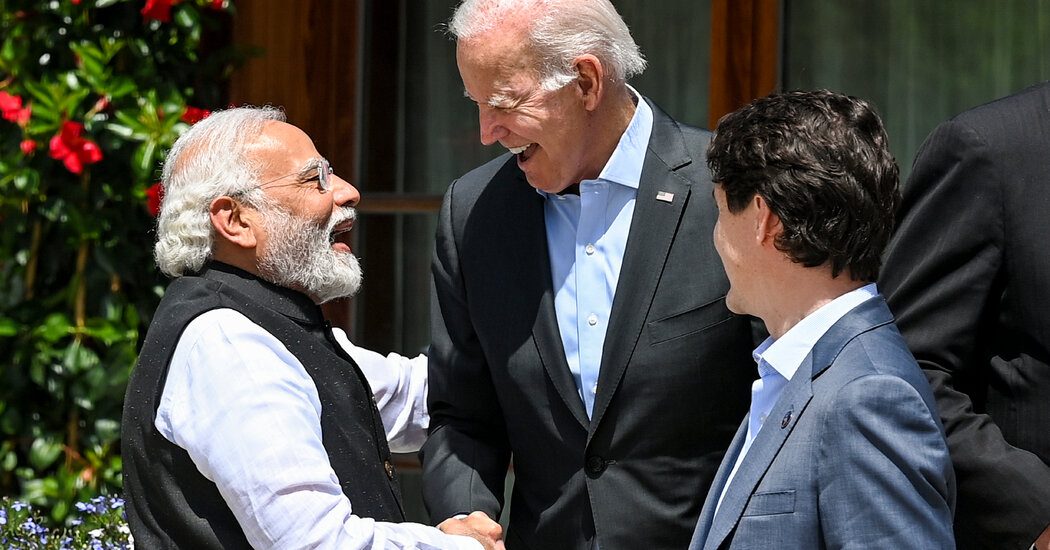Global Courant 2023-05-11 01:41:35
President Biden will welcome the Indian prime minister to the White House next month for a state visit and lavish dinner, providing a much-appreciated diplomatic perk to a critical economic ally, but also to a leader who has demonstrated authoritarian tendencies.
Prime Minister Narendra Modi will meet Mr Biden on June 22, according to a White House statement on Wednesday. It will be the president’s third state dinner after receiving the leaders of France and South Korea. Karine Jean-Pierre, White House press secretary, said the visit would celebrate “the warm bonds of family and friendship that connect Americans and Indians.”
For Mr Biden, the visit is an opportunity to bring India even closer together in terms of economic and security cooperation, especially when it comes to countering China’s growing influence in the global marketplace.
Rick Rossow, a senior adviser and the India chair of the Center for Strategic and International Studies, said it was in the United States’ interest to continue working with India, which is one of America’s largest trading partners and an ally on security in the region.
“The upside — commercially, security-wise — is strong enough where I think you’ll see high levels of engagement,” he said. “If you look at the numbers, look at bilateral trade and investment, the numbers are really pretty solid.”
But the visit will also challenge one of Mr Biden’s favorite observations: that the world is at a turning point where countries must choose between autocracy and democracy.
Mr Modi, the leader of the world’s most populous democracy, has steadily pushed his country towards what is effectively a one-party government, consolidating political power by sidelining his rivals and bending the justice system to his will.
In March, independent observers criticized the imprisonment of Rahul Gandhi, India’s best-known opposition leader and chief rival to the prime minister, for libel stemming from political criticism of Modi. The verdict led to Mr Gandhi’s removal from India’s parliament, a move that helped cement Mr Modi’s position at the head of his government.
It is the kind of development that Mr. Biden has warned about, both in the United States during President Donald J. Trump’s tenure and abroad.
“There is a battle between autocracies and democracies, and we have to succeed in that,” Biden said during remarks in Madrid last summer. He used the same phrase again at the United Nations in New York, during his State of the Union address this year and just two weeks ago during his meeting with the president of South Korea at the White House.
Mr Modi, who is wildly popular in India, has taken some of the same political approaches as Mr Biden’s predecessor.
Publicly, the Indian leader embraced Mr Trump as a sort of kindred spirit. Both rose to power by embracing right-wing populism and claiming they were champions of people fighting against a corrupt establishment. Both promised to make their country ‘great’ again. And both exploited religious, economic and cultural divisions.
During a 2019 political tour of the United States, he yelled “Howdy, Modi!” the prime minister spoke glowingly of Mr. Trump in front of 50,000 Americans at a stadium in Houston.
“Each time he was the same: warm, friendly, approachable, energetic and full of humour,” Modi said of Trump. “I admire him for something more: his sense of leadership, passion for America, concern for every American, belief in the American future, and determination to make America great again.”
Mr Rossow said excluding Mr Gandhi from parliament “probably registered a bit more” among people concerned about Mr Modi’s actions. But he said Mr Modi had also pushed within India to shift power from the central government to the states, even though many of the local governments are not controlled by his political party.
As a result, he said, Mr Biden is likely to focus on the broader issues common to both countries when Mr Modi arrives in Washington. The two men will also see each other this month during Mr Biden’s visit to Australia for a summit.
The United States is increasingly hoping that India can be a bulwark against China’s growing economic influence. Last year, Treasury Secretary Janet L. Yellen visited India in an effort to strengthen ties as the United States tries to free supply chains from its political and economic adversaries.
Mr Biden’s administration is trying to encourage chip makers and others to move their facilities to places like India, rather than remaining dependent on China. That desire increased after the Russian invasion of Ukraine, which contributed to the confusion of the global network of suppliers, particularly for high-tech goods.
“If they really start messing with how elections are conducted, if they take a dramatic step to worsen the livelihoods of Muslims in the country, then I think there will be a tougher look,” Mr Rossow said of Mr Modi and his government. in India. “But right now I think we can get around the little things we read about.”








